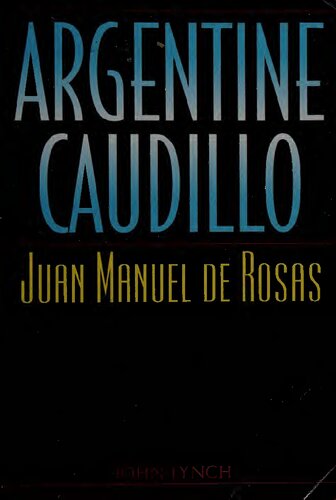

Most ebook files are in PDF format, so you can easily read them using various software such as Foxit Reader or directly on the Google Chrome browser.
Some ebook files are released by publishers in other formats such as .awz, .mobi, .epub, .fb2, etc. You may need to install specific software to read these formats on mobile/PC, such as Calibre.
Please read the tutorial at this link: https://ebookbell.com/faq
We offer FREE conversion to the popular formats you request; however, this may take some time. Therefore, right after payment, please email us, and we will try to provide the service as quickly as possible.
For some exceptional file formats or broken links (if any), please refrain from opening any disputes. Instead, email us first, and we will try to assist within a maximum of 6 hours.
EbookBell Team

4.1
50 reviewsThe figure of Juan Manual de Rosas dominates the history of Argentina in the first half of the nineteenth century. Charles Darwin, who met him on campaign against the Indians, described him as "a man of extraordinary character," the lord of vast estates and, for over twenty years, absolute ruler of Buenos Aires and its province. The present book studies the forces which made and sustained Rosas, and examines through him the roots of the caudillo tradition in Argentina. It reconstructs the world of great estates and the rise to power of their proprietors, establishing the relation of patron and client, of master and peon, the basis of political allegiance at that time. Argentine Caudillo follows the career of Rosas as a classical caudillo, who rescued his people from fear and anarchy and delivered them into the hands of a great dictatorship.
Leader of the gauchos, yet representative too of the powerful landed proprietors and cattle exporters, Rosas established an early prototype of a totalitarian state and employed systematic terror to defend his rule. The book helps to elucidate the concept and practice of caudillismo, or personal dictatorship, in the Hispanic world, and the use of violence to seize and defend power. It does this against a backdrop of transition from colony to independence, and then from anarchy to absolutism.Argentine Caudillo provides a detailed study of the use of state terror as an instrument of policy, one of the few such studies for any period of Latin American history. There is no book which duplicates this work either inside Argentina or outside. In Argentina, Rosas has become a subject of fierce controversy, partly because of his nationalism, partly because of his reign of terror. Consequently, while there is a vast bibliography on Rosas, much of it is polemical and